

The following will discuss this in greater details so that you will have a greater understanding of your elderly friends and relatives and know how to better care for them.
Who are older adults?
Proposed working definition of an older person in Africa for the MDS Project. What are cognitive abilities?
What are Cognitive Skills and Abilities?
By: Dr.
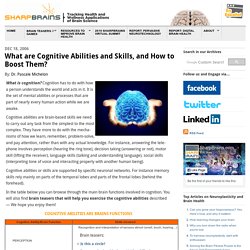
Pascale Michelon What is cognition? Cognition has to do with how a person understands the world and acts in it. It is the set of mental abilities or processes that are part of nearly every human action while we are awake. Cognitive abilities are brain-based skills we need to carry out any task from the simplest to the most complex. Cognitive abilities or skills are supported by specific neuronal networks. In the table below you can browse through the main brain functions involved in cognition. With age, some cognitive abilities tend to decline, especially the so-called executive functions, LearningRx Brain Training Center. Cognitive skills are the core skills your brain uses to think, read, learn, remember, reason, and pay attention.
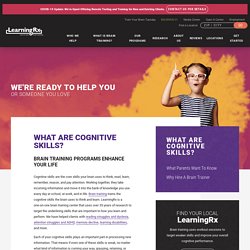
Working together, they take incoming information and move it into the bank of knowledge you use every day at school, at work, and in life. Brain training trains the cognitive skills the brain uses to think and learn. LearningRx is a one-on-one brain training center that uses over 35 years of research to target the underlining skills that are important to how you learn and perform.
We have helped clients with reading struggles and dyslexia, attention struggles and ADHD, memory decline, learning disabilities, and more. Each of your cognitive skills plays an important part in processing new information. Leading the active lifestyle. The Importance of Staying Active for Seniors. Exercise is essential at any age.

It is associated with many benefits such as a healthier heart, flexibility, fun living, and stronger bones among others. But for seniors, it has many more additional benefits. The Importance of Keeping Your Aging Senior Active. As you think about the best ways to care for your aging parent or loved one, one of the things you can do that will provide the most benefit in all areas of life is encouraging exercise.

Being active can help your aging senior in a wide range of ways, from strengthening social relationships to improving memory and even preventing depression. As you learn more about the benefits of staying active, you may find that you are surprised by a few of them. Take a look…. Exercise is a Social Activity. Aging and cognitive abilities. The Impact of Age on Cognition. Changes in Cognitive Function in Human Aging - Brain Aging - NCBI Bookshelf. Cognitive Skills and the Aging Brain: What to Expect. Every day we perform hundreds of cognitive tasks but are mostly unaware of the effort involved.
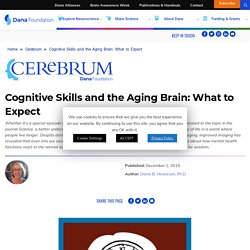
These tasks take different forms, such as noticing colors, remembering names, or calculating time on a watch. Measures of brain function using functional magnetic resonance imaging (fMRI) show that the most active areas of the brain vary according to the task being performed. Aging & Cognitive Function. How does aging affect memory and cognition (thinking)?
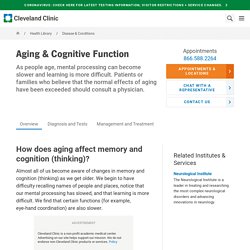
Almost all of us become aware of changes in memory and cognition (thinking) as we get older. We begin to have difficulty recalling names of people and places, notice that our mental processing has slowed, and that learning is more difficult. We find that certain functions (for example, eye-hand coordination) are also slower. Cleveland Clinic is a non-profit academic medical center. Advertising on our site helps support our mission. Age-associated cognitive decline. We use cookies to enhance your experience on our website.By continuing to use our website, you are agreeing to our use of cookies.
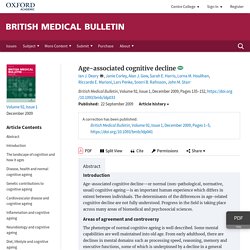
You can change your cookie settings at any time. <a href=" Find out more</a> Skip to Main Content Search Close Advanced Search. What Is Mild Cognitive Impairment? Some people with memory problems have a condition called mild cognitive impairment, or MCI.
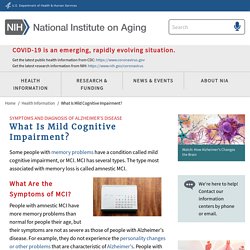
MCI has several types. The type most associated with memory loss is called amnestic MCI. Assessing Cognitive Impairment in Older Patients. As a primary care practice, you and your staff are often the first to address a patient’s complaints — or a family’s concerns — about memory loss or possible dementia.(1,2) This quick guide provides information about assessing cognitive impairment in older adults.
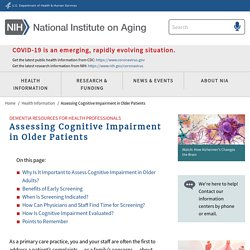
With this information, you can identify emerging cognitive deficits and possible causes, following up with treatment for what may be a reversible health condition. Cognitive Health and Older Adults. Cognitive health—the ability to clearly think, learn, and remember—is an important component of brain health.
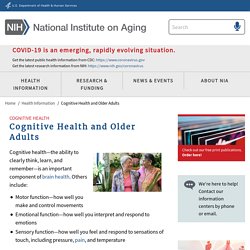
Others include: Parkinson's Disease. Parkinson's disease is a brain disorder that leads to shaking, stiffness, and difficulty with walking, balance, and coordination. Parkinson's symptoms usually begin gradually and get worse over time. As the disease progresses, people may have difficulty walking and talking. They may also have mental and behavioral changes, sleep problems, depression, memory difficulties, and fatigue. Both men and women can have Parkinson’s disease. However, the disease affects about 50 percent more men than women. Alzheimer's stages: How the disease progresses.
Alzheimer's stages: How the disease progresses Alzheimer's disease can last more than a decade. See what types of behaviors are common in each of the stages as the disease progresses. By Mayo Clinic Staff Alzheimer's disease tends to develop slowly and gradually worsens over several years. Eventually, Alzheimer's disease affects most areas of your brain. Dementia: Stages, Types, and More. Dementia is a decline in cognitive function. To be considered dementia, mental impairment must affect at least two brain functions. Dementia may affect: memorythinkinglanguagejudgmentbehavior Dementia is not a disease. It may be caused by a variety of illnesses or injuries.
Some dementias are progressive. In its early stages, dementia can cause symptoms, such as: Not coping well with change. Why do older adults need to stay active? The Importance of Staying Active for Seniors. 10 Reasons Why Seniors Should Be Active - NWPC. Exercise is crucial to maintaining your health and wellbeing, but it may be even more important in aging and senior adults. While there are concerns surrounding seniors exercising, the health benefits of an active lifestyle far outweigh the risks. It’s true that seniors may take longer to heal and recover from injuries, but moderate exercise levels are good for people of all ages.
Regular exercise and an active lifestyle for seniors provides a variety of health benefits that extend beyond the obvious, including improvements in blood pressure, diabetes, lipid profile, osteoarthritis, osteoporosis, and neurocognitive function. There are many reasons for seniors to have an active lifestyle that range from preventing physical injuries to improving mental health. Here are 10 key health benefits to seniors participating in regular fitness activities and upholding an active lifestyle. On the macro level, overall health quality is higher when seniors participate in exercise programs. Senior Exercise and Fitness Tips. No matter your age, it’s never too late to get fit. These easy tips will help you get started safely and make it fun. 5 Benefits of Exercise for Seniors and Aging Adults. Best Exercises for Seniors. For seniors, some exercise is better than no exercise, says Dr Linus Tan Ren Hao, from the Department of Physiotherapy at Sengkang Health.
11 Exercise Ideas for Seniors - Senior Health Center. GREAT 20 minute exercise workout for Beginners and Seniors!! Quarantined Home?? 20 minute exercise routine for seniors and beginners. 15-minute Sample Workout for Older Adults from Go4Life. Seated Exercises for Older Adults. Easy exercises to do while sitting. Tabata Exercises for Seniors. Exercises for Seniors - Stretching Exercises for Seniors - Exercises for the Elderly. 30 Minute Senior Zumba Cardio Workout.
Best Senior Workout - Fitness Exercises At Home. 7-Minute Yoga Workout for Older Adults. Senior Life Network - Low Impact Aerobics. High Intensity Interval Training For Seniors. Leg Exercises For Seniors - Knee Exercises - Exercises For Seniors. Why is it important to place emphasis on social activities for older adults? Participating in social activities helps preserve cognitive function: an analysis of a longitudinal, population-based study of the elderly. We use cookies to enhance your experience on our website.By continuing to use our website, you are agreeing to our use of cookies.
You can change your cookie settings at any time. <a href=" Find out more</a> Skip to Main Content Search Close Advanced Search Search Menu Article Navigation Volume 34 Issue 4 August 2005. Late-Life Social Activity and Cognitive Decline in Old Age. Senior centre report. Importance of Social Activities for Seniors. The Importance of Social Interaction for Seniors, Plus 9 Benefits. Before diving into the benefits of social interaction for seniors, let’s quickly look at a few detrimental outcomes that result from not being social.
Look at these terrible consequences that can result from being socially isolated: Loneliness – the topic of loneliness deserves its own article altogether, but the main takeaway in this context is loneliness is linked to cognitive and functional decline. A study from UC San Francisco found loneliness to be a risk factor for functional decline and also early deaths in seniors over age 60. Depression – a 2005 study out of Amsterdam by Max L. Stek and team showed that people with perceived loneliness were likely to be affected by depression, which in old age had a greater impact on mortalityLess physical activity – you’re less likely to be physically active if you’re going at it alone without an accountability partner or group of people to motivate you.
According to the National Institute on Aging: Which type of social activities may reduce cognitive decline in the elderly?: a longitudinal population-based study. How Do You Engage The Elderly In Social Activities? Isolation among seniors hurts more than anything else. Engaging socially is important for the elderly. Socialization is a way to build new relationships, adjust perceptions, and have fun.
Not only this, social engagement might help keep seniors from depression. Importance of Social Activities for Seniors. 10 Best Social Activities for the Elderly - Sandia View Assisted Living. Beyond Bingo: 14 Activities for Elderly People That Aren't Boring. Assisted living no longer means retiring to a rocking chair to watch TV and occasionally play bingo. Today’s seniors demand adventure, plenty of stimulation, and a chance to learn something new.
Indeed, most assisted living residents find that they have many more opportunities for engagement than they ever had at home. 9 Enjoyable Activities for Seniors with Limited Mobility – DailyCaring. Best Social Activities for Seniors - Altura Learning. Although you may not enjoy getting older, there are several perks. Now that your children are grown, and you’re no longer working, you finally have more time to do the things you’ve always wanted to do. For example, you could explore new hobbies. References.